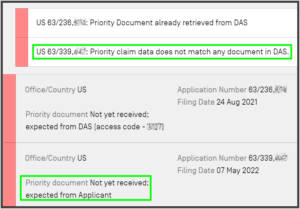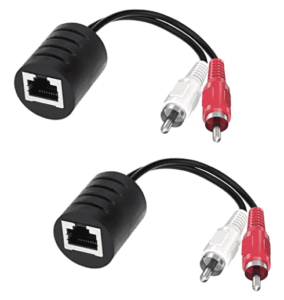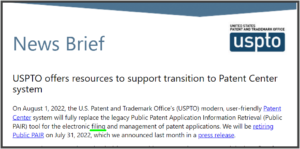
From time to time I have commented upon nice things about ePCT. Here is one more. Continue reading “YANTAePCT (Yet Another Nice Thing About ePCT)”

Bluesky: @oppedahl.com

From time to time I have commented upon nice things about ePCT. Here is one more. Continue reading “YANTAePCT (Yet Another Nice Thing About ePCT)”

Hello readers. For some twenty years now I have had the highest level of amateur radio license that it is possible to have (“extra class”), but until now I have not really made full use of the license (call sign AA2KW). Until now I had only made use of the license for communications in the two-meter (VHF) and 70-centimeter (UHF) bands. Those bands are only useful for local communications (with others who are no more than a few miles away). Recently, however, some neighbors who are good friends asked if I might introduce their grandchildren to the world of HF (high frequency) amateur radio, which can reach thousands of miles. So I have put my toe in the water and maybe soon I will successfully do some two-way communications in the 40-meter HF band. Continue reading “Starting an HF ham radio station”
Everybody who is a Comcast internet customer eventually finds out that if you have one of these Comcast-provided routers that is the size of a cereal box, you are providing something called an “Xfinity hot spot” to everybody in the world.
The idea of the Xfinity hot spots, of course, is that this becomes a selling point — a reason why somebody might want to subscribe to Comcast internet service, so as to be able gain the benefit of the ten million or so of these cereal-box-sized routers that are in place around the US.
When you as a Comcast customer learn that you have one of these routers, and you learn that you are hosting an Xfinity hot spot, you wonder if there is any drawback to this. Are you, for example, going to see a hit on your internet speeds if half a dozen members of the public are connected to your hot spot and making heavy use of the connection? (I have done tests and yes, if you put enough public users on the hot spot, it does slow down the internet for the paying customer, especially if they are on a low-speed tier of service.) But a completely separate question is, is the Xfinity hot spot taking up radio spectrum space that you might need in your home or office for other devices, such as Bluetooth hearing aids, DECT cordless phones, or mesh networking devices? And of course the answer is yes.
Comcast goes out of its way to tout the ten million Xfinity hot spots to their potential users, and goes out of its way to minimize its candor toward the customers who host those hot spots. It takes quite a lot of clicking around on the Comcast web site to learn that you, dear reader, are hosting such a hot spot, and it takes even more clicking around on the Comcast web site to learn how to toggle the hot spot on or off.
Which leads to the natural question, how does one go about turning off one’s Xfinity hot spot? I spent the past 24 hours trying to turn it off for my new service that got installed yesterday, and I have still not succeeded. Continue reading “Trying to turn off Comcast’s stealth wifi hotspot”
 The year was 2001 and semiotics (the study of signs and symbols and their use and interpretations) had by then permeated Western thought, I think mostly because of Umberto Eco’s erudite The Name of the Rose, published in 1980. I had just gotten done reading a rather baffling book that purported to find layers of meaning in the architecture of Hilton hotels around the world and their (I am not making this up) semiotic significance to the Cold War. And pulp writer Dan Brown had just embarked on his series of pop novels like Angels & Demons and The Da Vinci Code, each of which would build a whole story arc on the thinnest of semiotic reeds. Continue reading “The Annotated Alice”
The year was 2001 and semiotics (the study of signs and symbols and their use and interpretations) had by then permeated Western thought, I think mostly because of Umberto Eco’s erudite The Name of the Rose, published in 1980. I had just gotten done reading a rather baffling book that purported to find layers of meaning in the architecture of Hilton hotels around the world and their (I am not making this up) semiotic significance to the Cold War. And pulp writer Dan Brown had just embarked on his series of pop novels like Angels & Demons and The Da Vinci Code, each of which would build a whole story arc on the thinnest of semiotic reeds. Continue reading “The Annotated Alice”
This bit of news sort of snuck up on me. Only today did I catch on that five days ago, the Iranian patent office (formally known as the Intellectual Property Center (IPC) of the Islamic Republic of Iran) became a Depositing Office in the DAS system for two kinds of priority documents. Continue reading “Iranian patent office joins the DAS system as a Depositing Office”
 I am delighted to be able to report that the Polish patent office has become trendy, modern and up-to-date. Continue reading “Polish patent office becomes trendy, modern, and up-to-date”
I am delighted to be able to report that the Polish patent office has become trendy, modern and up-to-date. Continue reading “Polish patent office becomes trendy, modern, and up-to-date”
WIPO has announced that version 2.1.2 of its WIPO Sequence software will be available tomorrow (Wednesday August 3, 2022). You can see the announcement here. Here are action items for ST26 users: Continue reading “Version 2.1.2 of WIPO Sequence software available tomorrow”
Hello dear readers. In recent days I published two blog articles (July 15, 2022 and July 15, 2022) that are must-read articles for anybody who has filed any patent application on or after July 1, 2022 containing a sequence listing. If you have filed any patent application (PCT or non-PCT) on or after July 1, 2022 that contains a sequence listing, and if you have not read those two blog articles, you should read them. After that, you should return to this article and read this article. This article has more information from nice people at WIPO about the ST26 issues that I raised in those articles. Continue reading “Still more must-read for ST26 enthusiasts”

It is fun to learn about baluns. The word “balun” is a portmanteu (Wikipedia article) drawn from the words “balanced” and “unbalanced”. The idea of the balun (Wikipedia article) is to provide a way to connect a balanced electrical line and an unbalanced electrical line. I recently encountered the baluns that you see in the photograph at right, and I was pleasantly surprised to find that they really worked well despite falling far short of the classic defining qualities of a balun. Continue reading “Learning about baluns”

Just when you thought you were completely familiar with the USPTO e-commerce systems, you realize you were missing something important for all these years. Yes, it turns out that for all of these years, the Public PAIR system has been used for filing of patent applications. See this USPTO News Brief published today, which is quoted at right. Continue reading “PAIR was for filing patent applications?”